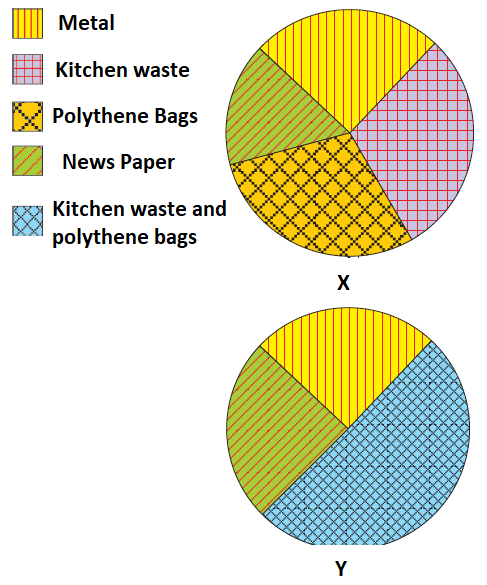
The pie charts A and B shown in figures are based on waste segregation methods adopted by two families X and Y respectively. Which of the two families X or Y do you think is more environmentally conscious and why?


Answer
493.2k+ views
Hint: The term "waste segregation" refers to the separation of trash into dry and wet categories. Wood and associated items, metals, and glass are examples of dry waste. Wet waste is organic garbage that is generally generated by restaurants and is hefty in weight due to the moisture.These sources are defined as producing four principal types of trash for the sake of this analysis: municipal solid waste, industrial waste, agricultural waste, and hazardous waste.
Because general garbage is separated and follows the municipal trash stream, waste segregation, or sorting into trash categories, results in lower volumes of hazardous trash. The expense of safely disposing of hazardous health-care waste is considerably reduced as a result of this.
Complete explanation:
Family X is more environmentally conscious and aware of the consequences of improper garbage disposal. As a result, it separates non-biodegradable garbage such as polythene bags from biodegradable garbage such as kitchen garbage. So that kitchen waste can be composted and polythene bags can be thrown away separately.
Family Y is not concerned with the environment in the same way that Family X is. As a result, Family Y is less concerned about the environment than Family X.
Waste disposal methods-
1. Recycling is a good idea.
2. Incineration is a method of destroying waste by burning it.
3. Other facilities for thermal treatment.
4. Treatments include chemical, physical, and biological methods.
5. Landfills are a type that is used to dispose of waste.
6. Logistics and collection.
Note:
Liquid waste is one of the five types of trash. All grease, oil, sludges, wash water, waste detergents, and dirty water that has been thrown away is referred to as liquid waste.
Solid Waste is a term used to describe waste that has been Any rubbish, sludge, or rubbish found in industrial and commercial settings is considered solid waste.
Hazardous Waste.
Organic Waste.
Recyclable Waste.
Because general garbage is separated and follows the municipal trash stream, waste segregation, or sorting into trash categories, results in lower volumes of hazardous trash. The expense of safely disposing of hazardous health-care waste is considerably reduced as a result of this.
Complete explanation:
Family X is more environmentally conscious and aware of the consequences of improper garbage disposal. As a result, it separates non-biodegradable garbage such as polythene bags from biodegradable garbage such as kitchen garbage. So that kitchen waste can be composted and polythene bags can be thrown away separately.
Family Y is not concerned with the environment in the same way that Family X is. As a result, Family Y is less concerned about the environment than Family X.
Waste disposal methods-
1. Recycling is a good idea.
2. Incineration is a method of destroying waste by burning it.
3. Other facilities for thermal treatment.
4. Treatments include chemical, physical, and biological methods.
5. Landfills are a type that is used to dispose of waste.
6. Logistics and collection.
Note:
Liquid waste is one of the five types of trash. All grease, oil, sludges, wash water, waste detergents, and dirty water that has been thrown away is referred to as liquid waste.
Solid Waste is a term used to describe waste that has been Any rubbish, sludge, or rubbish found in industrial and commercial settings is considered solid waste.
Hazardous Waste.
Organic Waste.
Recyclable Waste.
Recently Updated Pages
Master Class 12 Economics: Engaging Questions & Answers for Success

Master Class 12 Physics: Engaging Questions & Answers for Success

Master Class 12 English: Engaging Questions & Answers for Success

Master Class 12 Social Science: Engaging Questions & Answers for Success

Master Class 12 Maths: Engaging Questions & Answers for Success

Master Class 12 Business Studies: Engaging Questions & Answers for Success

Trending doubts
Which are the Top 10 Largest Countries of the World?

What are the major means of transport Explain each class 12 social science CBSE

Draw a labelled sketch of the human eye class 12 physics CBSE

What is a transformer Explain the principle construction class 12 physics CBSE

Why cannot DNA pass through cell membranes class 12 biology CBSE

Differentiate between insitu conservation and exsitu class 12 biology CBSE




